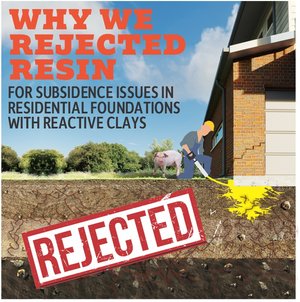Critical Questions Consumers should ask Resin Providers before engaging them for foundation repairs and rectification
In this guide, we want to inform and educate the consumer on 38 critical questions to ask a resin provider when dealing with cracks in walls, floors or other areas that may require foundation investigation in a residential property, why, and education on how to address this situation. This is intended to empower consumers with necessary due diligence questions to have all the facts at hand to make an informed decision.
We have written in detail on the subject of using resin or polyurethane injection to resolve foundation problems in a house. You can read more in that article “Why We Rejected Resin For Subsidence issues in Residential Foundations with Reactive Clays” to find out about the history, issues and purpose of resin and why we do not use it nor recommend it for foundation problems in a house.
SECTION 1:
The Need for Consumer Education On This Topic
Unfortunately, there are a lot of cowboys and misinformation in the industry cashing in to get consumer’s hard-earned money, but not providing quality reporting. We have made the decision as a leader in the industry to inform you, the consumer, about these issues.
In this guide, we want to inform and educate the consumer on what questions to ask a resin provider, so you are empowered with some great due diligence questions to have all the facts at hand to make an informed decision.
We recommend that you read the section below, “Section 3: What Does the Law Say” to get up to speed on why you would pose the below questions to a resin (or polyurethane) provider. For the purposes of this article, the words ‘resin’ and ‘polyurethane’ are interchangeable, as are ‘you’ and ‘your business’.
SECTION 2
Here are the 38 Critical Questions Consumers need to as a Resin provider before engaging them.
The Provider and The Assessment:
1. I understand that foundation issues are addressed by the National Construction Code. Will a RPEQ-registered Structural Engineer visit the site to assess and identify the cause of the foundation movement?
2. What is your RPEQ engineer number so I can check with the Board of Professional Engineers Queensland?
3. How are you formally qualified to assess the dwelling and how it is performing in accordance with the AS2870, the Australian Standard, and allowable movement tolerances?
4. I notice (if this is the case) that your business has a Builder’s Licence. Could you clarify what building work you’re doing in relation to my case that necessitates this licence? Are they connected?
5. Does your business have product, professional liability and workers compensation insurances, and if yes, can you provide me the details?
6. What liability do I have for you working on my property?
7. Will you identify and clearly report in writing on what the cause is for the soil changes?
8. Will you identify and clearly report in writing the reason for the foundation issues?
9. Will you provide me a site condition report so I can properly assess the problem?
10. Do you allow me to share all reports with others, or rely on them in any remedy action if needed?
11. Does your report say that to properly assess the cause or provide a detailed investigation, that this would require a separate report at additional cost, and what are those costs?
12. Does your report say that engineering investigations are at a further cost, and what are those extra costs?
13. Can you disclose to me the exclusions are in that report before I engage you?
14. How long have you been in this business and what was your trade or business experience before?
15. Is your role sales or inspections, or do you have direct field experience for foundation remedy and rectification that meets the National Construction Code, The PE Act, QBCC requirements and Consumer Law?
16. Am I in any way responsible or liable for any of the following:
(a) giving directions on the problem;
(b) checking levels;
(c) checking the suitability for the works proposed;
Tip: This is onerous on consumers. If this is the case, in our view, walk away.
The Product – Resin Injection:
17. Is resin a ground / soil treatment?
18. Will using resin injection permanently fix the foundation issues?
19. Has a RPEQ registered engineer assessed this as the best solution?
20. What happens if there is further changes in the soil?
21. What is the guarantee or warranty on the product?
22. How is it guaranteed/warranted (i) not to shrink, or (ii) or to correct the problems with the foundation?
23. Has the product ever failed to resolve foundation issues?
The Works and Workmanship:
24. What is the guarantee or warranty on the workmanship?
25. Will you cover any rectification works under the workmanship guarantee or warranty?
26. Is there a maintenance program required to monitor soil or foundation changes?
27. What is the cost and time period for that maintenance program?
28. What further cost do I need to factor if there are changes to the soil or foundations after the work is done?
29. Do you investigate the services under the property so no holes are drilled into them, or any resin interferes with these services, and can you guarantee that no resin will enter pipes (stormwater or sanitary) or spread where it is not intended?
30. What happens if we find it does – who covers the cost of rectification?
31. If the movement is too great when you start the works, and you need more product, will I have to pay for that?
Tip: Often we hear that more product is required and then still does not provide any lift as the movement is too great. In our opinion, walk away if an RPEQ engineer has not inspected and reported on the extent of the movement and works required.
32. How many cases have you had where more product is required than quoted?
33. Will you be lodging a building application with a Private Certifier for the works?
34. Will you be taking out the required insurance policy with the QBCC for the works on my property?
35. Can you send me a copy of the QBCC application and insurance policy that covers the works?
36. In relation to my property and works, will you be submitting a Form 15 and Form 12 ?
Tip: A form 15 is a compliance certification that what has been design to remedy the problem if installed or carried out complies with the building assessment provisions, and a Form 12 is the inspection certificate that certifies the works are compliant with the form 15 application.
37. How many cases have you had where you have had to return to a property because the resin has not produced the result the client desired?
38. Have you ever had a claim lodged against your works through QBCC or direct?
SECTION 3
What does the law say?
In essence, the stability and reliability of your footings and slab (foundation) of your house and the guarantees and warranties for those works is determined by:-
1. Consumer laws and protections;
2. Soil classification;
3. The design of the foundation (depth and initial design) to suit those conditions; and
4. What has changed since the original design, and what is needed now;
These factors are all governed by legislation to protect consumers, including:-
A. Consumer Laws, Protections and Confusion in the Market
As part of consumer and fair trading laws, the ACCC regulates customer guarantees. Consumers have basic rights, known as consumer guarantees, and businesses must provide an automatic guarantee to consumers with any product they sell.
In addition, certain works on residential buildings, like foundation works, fall under the National Building Code, and in Queensland, application is required to be lodged with the Queensland Building & Construction Commission (QBCC) for these works. The QBCC advise that most residential building work (this includes foundation repairs) in Queensland valued at more than $3,300 (including materials, labour and GST) must have insurance cover under the Queensland Home Warranty Insurance Scheme to protect consumers. This specifically includes works that affect the structural integrity of the building. The construction works that don’t require home warranty insurance is driveways, paths, fences, air conditioning, hot water systems, security doors and grilles and landscaping.
A business may also offer additional warranties to the consumer for the works that they undertake.
There is confusion in the market about what guarantees and warranties are actually being offered in this industry. Often it is a warranty about the product’s quality, not a warranty about the works being undertaken, and there are instances where no Building Approval application is lodged and no insurance organised for, or paid, to protect the consumer.
With foundation issues, consumers should seek to understand both the product guarantee and the works warranty and request copies of all documents, including the application to QBCC and the insurance coverage document.
For example, at Foundation Solutions we use Katana Screw Piles which are CodeMark certified to confirm the National Construction Code requirements have been met. We lodge the required application with the Private Certifier for Building Approval and also take out the necessary QBCC insurance so the consumer is protected as required by law. We lodge the required Form 15 compliance certificate together with a Form 12 Engineer Inspection and Form 43 for Termite Underpinning Spray. We provide our clients with copies of these for their future use and protection. We then provide a warranty for 8 years to our clients that exceeds the industry requirements. Note, we have never had an installation fail nor any claim against us.
You can read more at:
https://www.accc.gov.au/consumers/buying-products
https://www.qbcc.qld.gov.au/running-business/home-warranty-insurance-obligations/what-work-requires-insurance
B. Australian Standards:
The reactivity of the soils beneath a property will play a part in how our homes behave over the life of the structure. This in turn plays an important role in the extent of the damage and the method of underpinning best suited to support, arrest the damage and lift or stabilise a residential home building. Soils are identified by Site Classification in accordance with ‘Australian Standards AS 2870/2011, Residential Slabs & Footings’. These standards show when it is time to take action.
At Foundation Solutions: We only do works that are required, as not all cracks need remedy.
C. The PE Act (Professional Engineers Act):
Engineering services are governed by law, The PE Act. The main objectives of the act are “to protect the public by ensuring professional engineering services are provided by a registered professional engineer in a professional and competent way, to maintain public confidence in the standard of services provided by a registered professional engineers; and to uphold the standards of practice of a registered professional engineer.
The PE Act in Queensland states that a ‘Professional Engineering Service’ is defined as: “An engineering service that requires or is based on the application of engineering principles and data to a design or to a construction, production, operation, or maintenance activity relating to engineering” (see page 113 of the PE Act).
If you are engaging an engineer, ensure they are registered with the Board of Professional Engineers (if registered, they will be a RPEQ Engineer), who assess candidates as to their qualification and competency and issue a letter of assessment and fitness to practice. You can search to see if the person you are working with is a professional engineer at:
https://portal.bpeq.qld.gov.au/BPEQPortal/RPEQ_Directory
At Foundation Solutions: We only use RPEQ registered Engineers that specialise in foundation movement and assessments for your protection! These reports are tailored for you and your home, are transparent and comprehensive, and designed to be able to be relied on to keep you and your property secure and safe.
SECTION 4
Consider the small print in a report or quote
A qualified RPEQ Engineer adheres to a strict code of ethics and performance guidelines, ensuring their reports are reliable, comprehensive, and can be used by others, such as for designing rectification works.
It is important to be aware of the limited scope of reports, quotes, services, and guarantees or warranties. Consumers are encouraged to carefully review the small print to ensure that the information provided is reliable, comprehensive, and compliant with building codes. Be mindful that some providers will ask for additional costs for the consumer to obtain full disclosure reports.
SECTION 5
Obtain Another Opinion – Ask Us
There are a lot of questions to ask – we know. It can be a difficult and distressing process to navigate and understand. Especially when it involves one of most people’s biggest investment in life. Further, the small print and exclusions that can make the consumer liable or have shortfalls that do not protect them can be hard to detect.
Of course, we believe the best solution is to come to Foundation Solutions first. We are committed to providing solid education based on what the law states, what is needed to provide a correct and reliable solution and to back up our works with industry leading guarantees that do protect the consumer. The questions below above aim to give the consumer enough information to assess whether they can rely on the proposed solution.
We encourage consumer to consider Foundation Solutions for your project, particularly if the suggested approach involves using resin or concrete bored pier providers. We believe we have a superior product and solution and have a comprehensive understanding of where these other methods might fall short in delivering the desired results or guarantees.
If a consumer would like us to review the information they have received, we offer this as a complimentary service. We will highlight any areas of concern based on our experience and perspective. This offer is available to consumers who have not yet engaged another party for repair or rectification work and includes:
FREE REVIEW SERVICE:
Engineer Reports and Quotes
Resin Repair Reports and Quotes
Concrete Bored Pier Reports and Quotes
Underpinning Quotes
Please note that this is a complimentary service and does not constitute a contract between Foundation Solutions and the user.
SECTION 6
Further information, resources and articles
To be fully informed on the subject of foundation issues and the facts you need to gather to make an informed choice of provider and resolution, you may wish to also read:-
2. Why We Rejected Resin For Subsidence issues in Residential Foundations with Reactive Clays
3. Foundation /solutions Screw Pile Method -v- Concrete bord piers
4. Buyer Beware: New property Law in Qld – Seller Disclosures
5. Top 8 Reasons to use Screw Pile Underpinning
6. Cracks in Walls> Here’s how to determine if they are serious (and what to do about them): Superficial, Serious or Structural
Disclaimer: The content on this blog/document is intended only to provide a general summary of information of interest – namely to get consumers thinking about what questions they ought to consider asking prior to engaging an entity to provide foundation advice/services.
It is not intended by the writer to be comprehensive nor does it constitute any sort of advice (building/legal or otherwise).
While Foundation Solutions endeavours to ensure that the content of this blog/document is and remains current, we do not guarantee its accuracy.
This is particularly the case whereby the building industry by its very nature is prone to changes in procedure and standards.
Further, this information is general in nature and does not take into account your personal circumstances.
No two structural foundation matters are the same and each matter needs to be reviewed before a proposal and your avenues available can be given to you for consideration.
You should seek professional advice before acting or relying on any of the content of this blog/document or engaging an entity for foundation services.
To be clear, your use of any information contained in this blog/document is not intended to create nor does it create a customer-client or fiduciary relation between Foundation Solutions and yourself.



